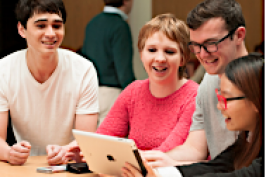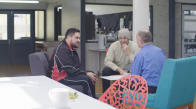Digital technologies professional learning

What support will teachers receive?
Teachers and kaiako can access a range of supports to build their confidence in ensuring that students have access to rich learning opportunities in digital technologies and hangarau matihiko curriculum content.
For information about other professional supports for technology education, see Technology professional supports.
Tahi Rua Toru Tech! NZ’s Digital Challenge
Tahi Rua Toru Tech is a national team-based challenge about creating solutions for real-world problems using digital technologies. It is for students in years 0–13 and takes place in ten regions over 12 weeks.
Tahi Rua Toru Tech is especially effective for students without high-level digital skills. Students can learn and strengthen skills in research, teamwork, written communication, design, and development. Resources and industry mentor partnerships are provided to support teachers and their students. Resources are available in English and te reo Māori.
Tahi Rua Toru Tech is being delivered in partnership between the Ministry of Education and not-for-profit organisations led by IT Professionals and Royal Society Te Apārangi.
This free programme is designed to support you to introduce the new Digital Technologies & Hangarau Matihiko (DT&HM) curricula content to year 0–13 students and ākonga and is available in English and te reo Māori.
Watch the Technology Online webinar with teachers talking to project leader Joy Keene about how they are using the digital challenge in their classrooms:
Raranga Matihiko
Raranga Matihiko | Weaving digital futures
Raranga Matihiko are museum-led workshops that weave student and ākonga learning through digital technologies, creative exploration, and collaboration.
Inspired by museum taonga, primary and secondary school students, and kura ākonga will share their stories through a range of digital products.
Te Papa is working in partnership with Waitangi Treaty Grounds and Te Kōngahu Museum of Waitangi, Waikato Museum Te Whare Taonga o Waikato, and MTG Hawke’s Bay.
Raranga Matihiko – has a growing range of resources available, to support students, whānau, teachers, and leaders. Includes the following.
- Progress outcomes for digital technologies – supports teacher understanding of the progress outcomes for Computational Thinking and Designing and Developing Digital Outcomes and outlines Progress Outcome 1-3 for Computational Thinking and Progress Outcome 1-2 for Designing and Developing Digital Outcomes.
- Ngā Tupuruanga o Hangarau Matihiko – He rauemi kaiako tēnei hei whakamārama i Ngā Tupuranga. He rautaki, he ngohe hei whakamātau atu hoki i te karaehe.
- Decoded for learners series – a guide for learners on language and concepts in computational thinking for digital technologies and designing and developing digital outcomes.
The Raranga Matihiko | Weaving Digital Futures programme is available in Wellington, Waitangi, Hawke's Bay, and Waikato for all decile 1–3 schools and kura.
Programmes are designed specifically for learners in your classroom, to build on your inquiry, and involves at least 16 hours face-to-face facilitation.
To book or inquire about this programme, please contact [email protected].
For more information, go to: Raranga Matihiko | Weaving Digital Futures.
In a Technology Online webinar, Project Director, Tara Fagan, talks about using Te Papa museum's taonga with primary and secondary school ākonga to develop understandings of digital technologies:
In a Technology Online teaching snapshot see how taking part in Raranga Matihiko inspired students at Richmond School to use digital technologies in their interest projects.
- Career videos – examples of digital outcomes – years 4–6 students from Richmond School completed projects that included creating videos about careers linked to their interests.
Digital Technologies and Hangarau Matihiko Online for NCEA
The University of Auckland and Ministry of Education have partnered to make the online learning modules Digital Technologies and Hangarau Matihiko (DT & HM) for NCEA.
These modules support teachers, particularly those who are not subject specialists, to teach digital technologies and hangarau matihiko curriculum content at senior secondary levels. The modules provide student activities and teacher guides. Each module is divided into sections that focus on one NCEA achievement standard. Teachers can pick and choose parts of the modules to use for learning and/or revision.
Six modules at NCEA level 1 are available, including two digital technologies standards translated into te reo Māori.
Three modules at NCEA level 2 are available.
View this short introductory video which provides an overview on the resources.
Teachers can register for any of the modules. Register at stemonline.auckland.ac.nz.
Teachers receive a direct link and class code once registered. The link allows immediate access to the requested module.
The Ministry of Education is keen to hear feedback on this approach to support teachers in other learning areas. To share your experience and feedback, contact [email protected].
separator
Networks of Expertise for digital technologies
Networks of Expertise support subject associations and broader networks used by teachers and school leaders. The focus is building teacher capability at school/kura and Kāhui Ako at regional and national levels to deliver rich, locally relevant learning experiences across the curriculum.
Digital Technologies Teachers Aotearoa (DTTA)
An association with the goal of advocating for our subjects, the aim of DDTA is to create a community of teachers who share resources and who communicate and speak with one voice to gain recognition for digital technologies.
For more information, contact: [email protected]
Robotics and Computer Science in Education
This teachers' network is described as being "like a community garden for teachers working in the New Zealand digital curriculum".
For more information, contact: [email protected]
Related videos
Learning with the internet of things in years 7–8 (04:15)
Bill Boyes, Iain Cook-Bonney, and Tahuna Normal Intermediate School students talk about the wide range of digital technologies they can now make using their new skills....
Learning with the internet of things in years 5–6 (04:48)
Andrew Wills and the students at Bradford Primary School describe how they used their new knowledge in electronics to solve problems in their school....
Collaboration between Ngāti Rangi Trust and Ruapehu College in digital technologies (04:10)
Erena Mikaere-Most from Ngāti Rangi Trust and Principal Kim Basse discuss their collaboration and the impetus for this project....
Creativity, critical thinking, and problem solving in digital technologies (03:16)
The digital technologies teacher, principal, and students discuss the success of the approach used to engage students, and in particular girls, in digital technologies. ...
Entry and exit portfolios in digital technologies years 9–10 (03:30)
In this video ICT Tutor Kawana Wallace describes the rationale and use of the exit and entry portfolios and how they were developed. ...









